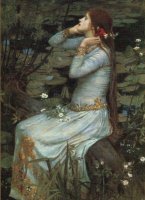The criticism

The critic story of "Hamlet" passes for three stages until nineteenth century; it is a great work but barbarous which needs cuts and alterations and Voltaire thinks its story is absurd and ridiculous; but critics and theatre men whom performed it with success, don't find in it nothing of ambiguous and little understandable. Hamlet is a renaissance energic prince, active, also violent and with a typical vein of depression, who feigns madness and plans with caution the revenge, and though the luck betrays him at the end he dies after reached his purpose. A tragedy of revenge, at conclusion, with a positive hero with not problematic psyche. The shadow of the death and of the bereavement stretchs from top to bottom on this ominous work. The ghost opens the tragedy representing its death and its funeral immediately followed by wedding, and it unleash a really Tragedy of errors, characterized by murders that never are those wanted, by meditated or actuated or unintentional suicides, and by funerals; it's a triumph and a party of death. On the formation of the charaters, the hero is followed by a faithful and sincere friend with two female figures. The first one is the kind of imploring, the second one is the central female figure who contributes to unleash the tragedy: Gertrude is associated with usurper and she's ambiguous in her motivations. Hamlet looks separated by passionate faith in aristocratic merits and the consciousness of their dissolution, between loving affection to feudal family and sense of its ruin. Hamlet is similar to Oedipus in his want to know, in him choice to pass from quiet and luminous appearance to not apparent knowledge of the truth and that is in his want to pass from general to be to real to be, that succeed him only in the death.